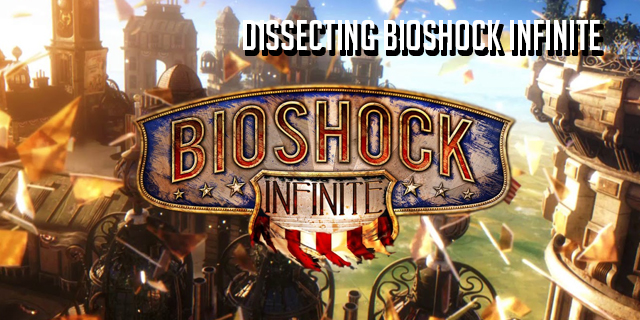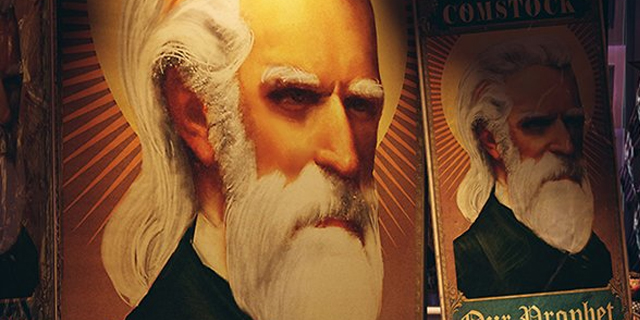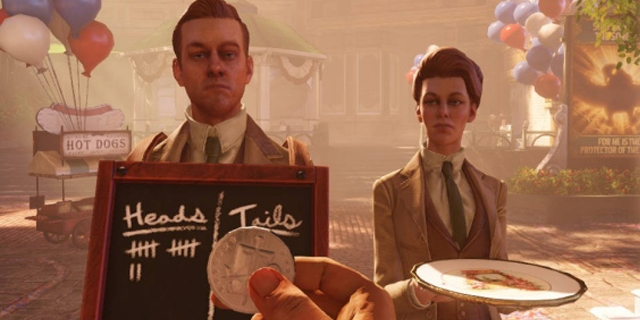Press Start may receive a commission when you buy from links on our site at no extra cost to you.

You can find our review for the game here
Pre-notice: this is an analysis of Bioshock Infinite. Spoilers will not only be mentioned, but freely explored and taken apart. Consider this your warning.
Seriously, final warning. Ok? Ok.
So. Bioshock Infinite. I’m going to say this now; regardless of how you felt about the previous game or any game in general, this is an experience worth playing. Despite it’s detractors (of which there are pouring out of the seams now), there is absolutely nothing else like this. There won’t ever be anything like this again, and like it or hate it, it can be universally agreed that this is an utterly unique experience.
There is nothing else I can say that would change your mind at this point. You’ve either played it and loved/hated it, or you’ve completely ignored it. Maybe when it’s cheaper you would give it a shot, and I wish you luck in trying to avoid spoilers. This is a perfect example of a proper, intelligent game.
Let’s talk about the ending? It’s a confusing mess of quantum physics and inter-dimensional travel and alternate timelines and oh my God it’s just like Looper all over again, isn’t it?
Here’s my attempt at sorting out the timeline. Hold on, it’s bloody confusing:
In the canon path, Booker is obviously…born. In all paths of life (at least bound in the game), he ends up at Wounded Knee and commits atrocities, leaving him traumatized by whatever it is that happened.
Booker is approached with the act of ‘baptism’. This is where the path splits.
In one path, Booker accepts the baptism, cleanses himself of sin, and is ‘born again’ as a completely new person.
Comstock.
Comstock is born again without sin, and becomes the evangelist/prophet we all come to see and hear. He meets with the Lutece’s and formulates a plan to create the floating city of Columbia. This is where I missed the details but eventually the US government considers Columbia an enemy and Comstock and his population of followers and worshipers take Columbia up into the sky, to never touch the ground again.

In the canon of Bioshock Infinite, we play as Booker who was NOT baptised. This Booker was never cleansed, fell into deep gambling and drinking problems. He soon ended up in a debt that was too big for him. One that required giving up his daughter Anna DeWitt. As they say; ‘bring us the girl and wipe away the debt’. Of course, if you’re playing through this the first time, you automatically assume this means bringing back Elizabeth back to New York in order to wipe away the debt. This is not the case. The phrase is from a flashback, and required Booker to give up his daughter Anna in order to wipe his debt. Ok, still with me?
Eventually Booker regrets his decision and races to save his daughter, who is being pulled through a ‘tear’ into the Columbia world, fabricated by the Lutce’s. He fails to save her, and her pinky is sliced off as the tear closed on her finger. This is the explanation for Elizabeth’s powers. As she technically exists in two universes, this allows her to create tears at will and ultimately create entirely new worlds.
Of course, the one who CHOSE to wipe Booker’s debt is none other then the male counterpart of the Lutece’s. He and his ‘quantum twin’ (it will be explained) and Comstock (baptised-Booker) plot to kidnap Anna as Comstock needs a genetic heir to fulfill the prophecy.
Can I just take the opportunity to say that the Lutece’s are two of the most ingenious and clever characters ever created? Absolutely wonderful and unique, they are one of the best parts of Bioshock Infinite.
Anyway, this kidnapping/trade occurs because of Comstock’s inability to conceive a proper heir with Lady Comstock. Travelling through tears created by the female Lutece (Rosalind) has led him to become sterile. He thus concocts a plan to steal his alternate-dimension self’s daughter through the tears the Rosalind creates. Obviously when he brings the child to Lady Comstock she suspects infidelity. Comstock kills the Lutece’s and Lady Comstock to hide the true reason. 15-20 years pass and Anna DeWitt is now the Elizabeth we encounter in the game.

The Lutece’s, not quite dead due to their ability to travel through tears at will, have a change of heart. At least, the male (Robert) does. They decide to bring Booker into Columbia in order to rescue Elizabeth from her tower, distorting his memories so he does not remember ever giving his daughter to the Lutece’s.
Eventually he rescues Elizabeth, he remembers everything and all is well. Sort of.
Something strange about the game was Elizabeth’s insistence in creating a new tear every time something didn’t go to plan. This showcased the story’s insistence of an ‘infinite number of worlds’. When the gunsmith died, Elizabeth created a tear and created a new world where the gunsmith was never arrested. This only led to something far worse happening. The ‘butterfly effect’, you could say.
This ultimately leads to the story’s message in heart: that everything is infinite. In a delightful throwback, we are transported to Rapture (in order to kill the antagonist Songbird) and that is implemented as just another ‘variation’ of the universe created in Infinite. I thought this was ingenious. I initially thought that the gameplay was a little TOO similar to the original, then I realized it made sense in the context of the story. It’s MEANT to be similar because the story tells us, it’s just a different variation of the same path. Everything is infinite and linked. It’s why both games start with a lighthouse. It’s why the actual gameplay of the game remains resolutely similar
Another thing to take away from the Rapture visit is when Booker uses the Bathysphere. If you have played the first Bioshock, you would know that all Bathyspheres are coded to Andrew Ryan’s DNA. You could easily assume that Booker is related to Andrew Ryan in some way. Of course, another interpretation to take is that this is NOT Bioshock’s Rapture, that this is simply another universe in an ‘infinite’ collection of worlds. This Rapture could be incredibly similar but different in some aspects, such as the loss of a DNA encoding for the Bathysphere. There are a multitude of directions to take.
Early in the game you are faced with a coin toss. No matter what the outcome is always heads, and as the female Lutece marks it on the chalkboard that the male Lutece is wearing, you notice that EVERY instance of coin flips have been heads. If you count, there are 122 instances.
This signifies Booker’s attempts. This is not the original Booker we are playing. This is the 123rd instance of him. This is the 123rd universe that the Lutece’s have created for Booker. He has failed in the past 122 attempts and the coin flip is a representation of whether things will be different. Of course, while he still flips heads (and the Lutece’s assume nothing will change in this instance) he DOES succeed in the end.

In the end, we are faced with an infinite number of loops, and Elizabeth would always fail in her escape and Comstock would prevail. The only possible end (and yes, this is riddled with plot holes) would be to kill Booker at the ‘fork’ of the road, where he made the ultimate decision to become Comstock or not. The baptism. Elizabeth and her Elizabeth counterparts in all the alternate dimensions converge on Booker at the baptism and he chooses to let them drown himself, in order to close the loop. So yeah, it’s like Looper, I guess.
In order to avoid a paradox, all Booker’s must be eliminated. Baptised Booker, unbaptised, whatever there was, at the defining fork in the road, he must be stopped, as there cannot be even one universe where a Baptised Booker exists otherwise the loop continues.
In the post-credits scene, we establish that since the loops were closed we are back to pre-death Booker back in his office with what possibly could be his daughter, Anna/Elizabeth (she is not seen). The explanation can be that since Booker was killed at the baptism, ALL possible variations of Booker becoming Comstock are forever gone, leaving at least one universe where Booker gets to spend his life with his daughter. Since the probability of Booker becoming baptised has been reduced to 0%, it is no longer a paradox that he chooses Baptism or not. Baptism is a 0%. So you could interpret that as to being that Booker is allowed one universe where he continues on, having never turned into Comstock. The cry at the end implies that Anna was never sold. Bittersweet.
Like I said, it’s a game that requires thought and repeated playthroughs to understand. While the plot will ultimately divide some of us, this is something that is utterly unique and deserves to be experienced at least once.


